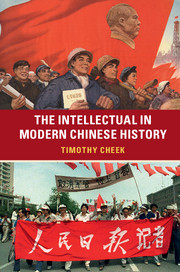Book contents
- Frontmatter
- Dedication
- Contents
- List of figures and maps
- Preface
- Acknowledgments
- List of abbreviations
- Map of China
- Introduction: for the public good
- 1 Reform: making China fit the world (1895–1915)
- 2 Revolution: awakening New China (1915–1935)
- 3 Rejuvenation: organizing China (1936–1956)
- 4 Revolutionary revival: overthrowing the lords of nation-building (1957–1976)
- 5 Reviving reform: correcting revolutionary errors (1976–1995)
- 6 Rejuvenation: securing the Chinese Dream (1996–2015)
- Conclusion: intellectuals, China, and the world
- Who's who (intellectuals featured in the main text)
- Further reading
- Bibliography
- Index
Introduction: for the public good
Published online by Cambridge University Press: 18 December 2015
- Frontmatter
- Dedication
- Contents
- List of figures and maps
- Preface
- Acknowledgments
- List of abbreviations
- Map of China
- Introduction: for the public good
- 1 Reform: making China fit the world (1895–1915)
- 2 Revolution: awakening New China (1915–1935)
- 3 Rejuvenation: organizing China (1936–1956)
- 4 Revolutionary revival: overthrowing the lords of nation-building (1957–1976)
- 5 Reviving reform: correcting revolutionary errors (1976–1995)
- 6 Rejuvenation: securing the Chinese Dream (1996–2015)
- Conclusion: intellectuals, China, and the world
- Who's who (intellectuals featured in the main text)
- Further reading
- Bibliography
- Index
Summary
“Serve the People!” This clarion call from Mao Zedong is one of the signature phrases from the Chinese revolution, and particularly the phase of it led by the Chinese Communist Party. But the phrase did not originate with Mao. The sentiment in its modern form pre-dates Communist ascendancy by at least half a century and animates intellectual life in China today. Mao's call, in fact, is but a particular version of the intellectual vocation to serve the public good that is captured in the classical question weigong ruhe 為公如何 (how best to serve the public good). The Chinese thinkers and writers we follow in this book all sought to serve the public good (gong), albeit according to their own lights. Nonetheless, the phrase “serve the people” captures the ambiguities and changes that have characterized intellectual public service since 1895. The meaning of “service,” “the people,” and the implied actor—who is qualified to provide this service to the people—changed significantly over the century.
The birth of the long twentieth century
The “long century” from 1895 to the 2010s has confronted China's thinkers and writers with unprecedented disasters and existential threats that became increasingly personal. China in 1890 was not a country, it was an empire, the Qing empire, ruled by non-Chinese Manchus but experienced as Chinese civilization (known as Tianxia, “All under Heaven”). This all came crashing down between the Qing's defeat in the Sino-Japanese War of 1894–5 and the actual fall of the dynasty by 1912 and its replacement by a modern-style republic. This profound political change shaped China's long twentieth century, making it a nationalist century. The Qing empire had perforce become China, the nation-state. For all the changes recounted in the pages to follow, one shared concern animated the range of intellectual activities we shall encounter. It was to identify, preserve, and perfect this new thing—China: nation-state, society, and personal identity.
China's educated elites in the closing years of the Qing Dynasty were scholars: a few scholar-officials serving the state as its privileged administrators and most serving as lettered local elites enjoying life as prosperous landlords and local notables respected in their communities and legally immune from corvée labor and corporal punishment. They studied the Confucian classics in order to pass the state examinations that would certify their elite status.
Information
- Type
- Chapter
- Information
- The Intellectual in Modern Chinese History , pp. 1 - 28Publisher: Cambridge University PressPrint publication year: 2016
